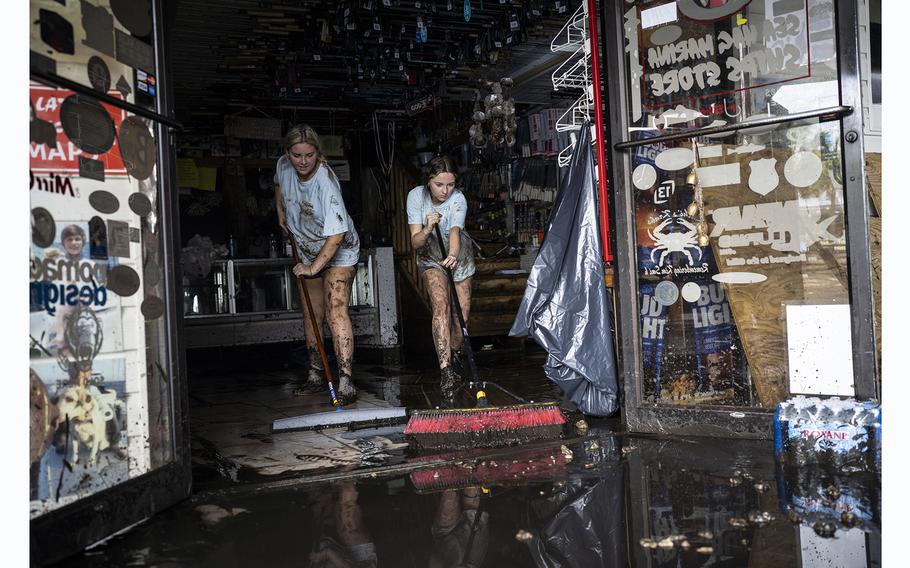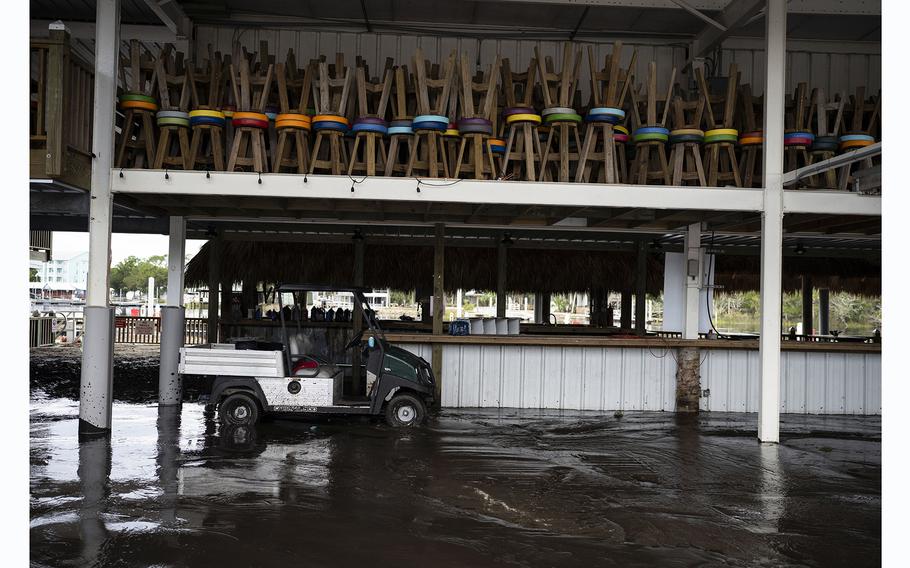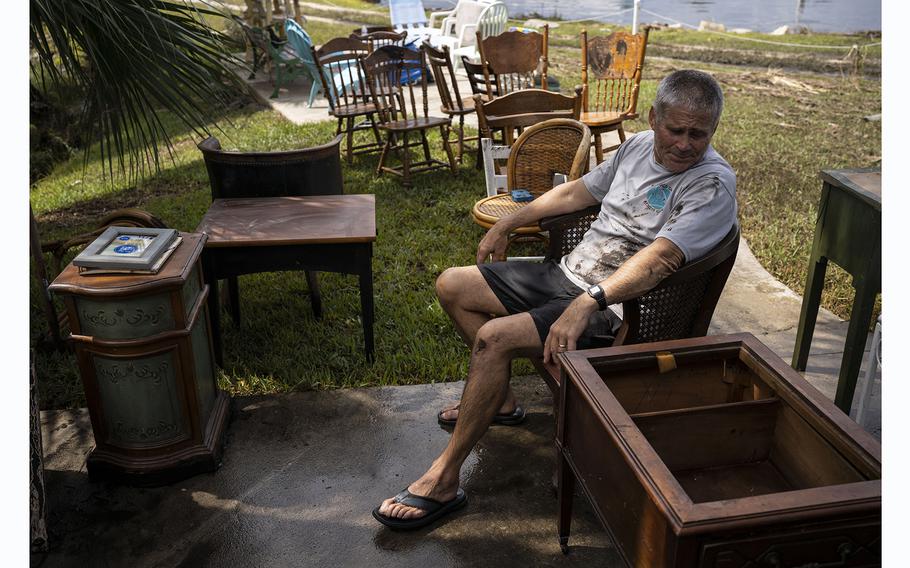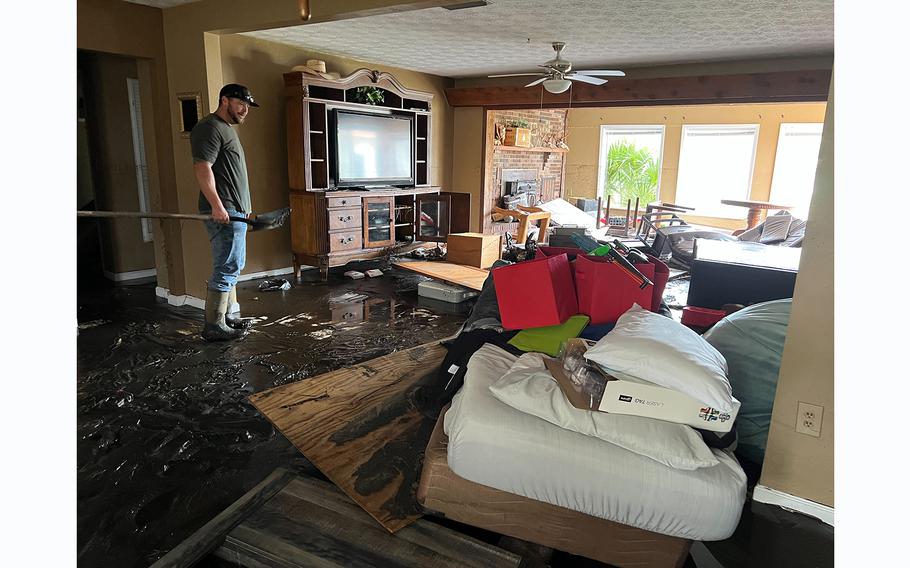
Katie Cole, left, and her sister, Savannah Cole, clean mud out of the Sea Hag Marina gift shop, where they work as cashiers, on Thursday, Aug. 31, 2023, in Steinhatchee, Florida. (Thomas Simonetti for The Washington Post)
STEINHATCHEE, Fla. - Hurricane Idalia devastated this tiny scalloping town about 90 miles south of the state capital, inundating buildings with water from its namesake river and the nearby Gulf, tossing aside sailboats and docks, and sending several feet of stinking mud and seaweed into homes and businesses.
Beginning just after the storm hit Wednesday, many of the 580 residents were at work mucking out and rebuilding, a routine that's come to feel inevitable in recent years as massive storms slam the Gulf.
"This is what we do," said Ben Wicker, 49, as he stood amid drying furniture outside Roy's, his family's flooded riverfront restaurant.
Wicker's home up the street had also flooded. But he'd been too busy cleaning the restaurant to even assess the damage to his house.
Wicker had the restaurant's 30 employees to worry about. He needed to meet with the governor, who toured storm damage Thursday; with insurance adjusters and contractors who would tell him whether Roy's, built in 1969, was still sound, especially the back end, which rests on pylons over the river. Wicker hoped that his restaurant would reopen in a few months, and that his staff could hold on until then with unemployment.
As much of the state responded with relief that Idalia's death toll and damage had not been worse, the people of Steinhatchee were left to manage the ruins of their lives and find a way to recover. They had to do the same thing almost exactly seven years ago, after the town was last thrashed by a hurricane, in that case Hermine.
Then and now, the hurricanes' timing was terrible for Steinhatchee. The weeks surrounding Labor Day mark the end of peak scallop season here, when riverfront businesses can earn hundreds of dollars per day from rented scallop gear, riverboat tours and charter fishing. And when scalloping season ends next week, another local fishing season commences: Gag grouper. All that is postponed.
Clifford Phillips was scraping mud from the Steinhatchee River Inn & Marina, where he works, hoping to get it up and running for fishing customers.
"Everybody kind of knows what to do. It's Florida. I'm a local," Phillips, 35, said. "We were prepared."
But there's only so much anyone can do to prepare for a Category 3 hurricane making landfall nearby. The marina was a mess of mud, where downed power lines mixed with a fallen metal tower. On the river, a mass of wood ripped from the marina in the storm surge resembled a giant raft.
"As you can see, all of our docks are piled up," Phillips said.
Two neighbors who arrived to help shouted, "Y'all got water down here yet?"
Phillips tried the hose: Nothing.

Stools were stored out of harm's way at the Sea Hag Marina during cleanup after Hurricane Idalia hit. (Thomas Simonetti for The Washington Post)
Up the road at Sea Hag Marina, some of the more than 45 employees who normally would have been tending to paying customers pitched in brushing mud from the shop and bar with rubber squeegees.
"I would love to have a job," said Katie Cole, 18, who wore a mud-spattered Sea Hag Marina T-shirt, shorts and rain boots as she swept mud from the office where she normally staffs the counter.
Danielle Norwood, whose family owns the marina, said three of their 28 nearby cabins flooded and "everything on the waterfront went under." Labor Day is usually a big weekend for business, with the same families from Gainesville, Jacksonville and Georgia booking cabins for years, she said, reserving them at least a year in advance.
Most of their customers insisted on paying for their canceled stays, to help the marina recover, she said. "Some might drive down to not miss a year," Norwood, 58, said.
Norwood hoped to bring in fire hoses to wash the mud from the marina's deck and parking lot. But first, the water system had to be repaired. Water had grown scarce, she said, as leaks in damaged houses drained the water tower. There was a boil water order, a curfew, and power was still out.
But that didn't slow residents, who had generators humming and backhoes and earth movers hauling debris from yards. They were aided by an army of first responders who descended on the town, including sheriff's deputies from neighboring counties, National Guard soldiers, firefighters, work crews and volunteers from as far as Pennsylvania and Texas.
Many ate at a makeshift kitchen set up across from the marina, where Skyler Hanna, a dental office manager, assembled hot dogs while her fiancé Bradley English flipped burgers on the grill.
"There's a family feel here. Everybody just shows up and helps," said Hanna, 29, who planned to hold her wedding at the marina in December and was confident it would be restored by then.
Next door to the marina, Bobbi Pattison, 82, and her son were cleaning her flooded, pale green house, labeled "The Hatch."
Norwood ducked her head in the door. "There's food across the street," she said.
"We'll see you over there in a bit," Skip Pattison said.
Pattison, 59, a Delta pilot, had driven down from Atlanta knowing his mother would need help cleaning the three-bedroom ranch. His father, a retired U.S. Army colonel who usually managed cleanups, had died just after Christmas.
"It's a little different, mucking out without him," Bobbi Pattison said.
Her face and hair tinged with mud, she showed off some of her husband's Army medals, which she'd managed to salvage. A retired Army auditor, she recalled how she and her husband had both worked at the Pentagon. She still has a farm in Skipwith, in southern Virginia, where she stays part of the year, but the Steinhatchee house has been her second home for 40 years.
Now her stove and refrigerator were in the living room, mired in mud.
"They're living room furniture," she joked. "Actually they're trash. We have to take them to the dump."
There was just so much to do. Pattison's cement floor was coated with several inches of mud, her belongings churned around inside. Storm winds had hurled a wicker table through one of her windows, which needed fixing. She wondered if the local gas station, Maddie's, was up and running (it was, courtesy of a generator). Pattison's son moved most of her salvageable wood furniture outside to dry.
He was loath to move it back in after the house is cleared of mud. Bobbi Pattison also owns a home across the road on higher ground, untouched by the storm. He wanted her to move there, raze the waterfront house and rebuild it, elevated.

Skip Pattison, from Atlanta, takes a break from helping his mother, Bobbi, clean up her house in Steinhatchee, Fla., on Aug. 31, 2023. (Thomas Simonetti for The Washington Post)
"It's a heated debate right now," her son said. "We've done this too many times. And it's becoming more frequent. We're too old to do this."
A local elementary school teacher had rented the house across the street, however, and his mother said she didn't want to displace her. But she was tempted.
"I'm almost to the point where I'm tired of it. I might just move across the road," she said. "If the water would just behave itself . . ."
Down the riverfront road, Fred Mitchell, 89, returned home to find a 5-foot-high water mark on his elevated stone house. His first floor garage had flooded, but his house was mostly dry.
"At least my living quarters up there is all right," Mitchell said. Walking slowly with a cane, he surveyed a bizarre array of waterlogged storm debris in his yard: A green marker, a lightbulb, a box of envelopes, a Bill Monroe bluegrass CD.
His grandson Todd Mitchell, who works with his father in their mortgage and finance business, was busy clearing seaweed from the front stairs by hand. Fred Mitchell walked around back to check the waterfront.
"My big dock is still there. I lost my little dock," he said.
"It's in the yard!" his wife, Zelda, shouted down from the deck.
Fred Mitchell started to put on a pair of rain boots, intent on saving a wood desk in his muddy garage. He managed to get one Velcro sneaker off before his grandson noticed and said, "Paw Paw, what are you doing?"
Fred Mitchell gave a sly smile. "I don't guess I'm going in there," he said.
"If it's salvageable, we'll pressure wash it," his grandson said of the desk. "Let's put that shoe back on and you can go up there and find out about the generator."
Todd Mitchell fastened his grandfather's shoe, then grabbed a shovel and headed to his ranch house next door, which had flooded. The counters were covered in seaweed, which poked out of cabinets and the oven.
"We set a lot of stuff on the countertops thinking maybe it wouldn't get that high," he said.

Todd Mitchell, 39, cleans up his flooded home in Steinhatchee, Fla., on Aug. 31, 2023. (Molly Hennessy-Fiske/Washington Post)
He'd managed to save his favorite Black Rifle coffee mug. He and his wife were building a new house inland, he said, and the construction was still intact. They might just move temporarily into a camper over there, he said, away from the water.
In his 39 years, surviving storms on the water had become an endless, exhausting cycle of frantic preparation, destruction and rebuilding, he said. As he left his house, Mitchell spotted something in the garage amid the seaweed: An open Bible, with a photo tucked into it of his late grandmother.
"Stuff like that can make you smile, and at the same time cry," he said.
He lifted his T-shirt to wipe sweat and tears from his face. He looked at his family's flooded garages, the trash and debris. There was so much work yet to be done. But he and his town were accustomed to hard work.
"Ain't nobody leaving here. They rebuild and go on," Mitchell said.
And so he set off, shovel in hand, to find a pressure washer and tackle the mud.